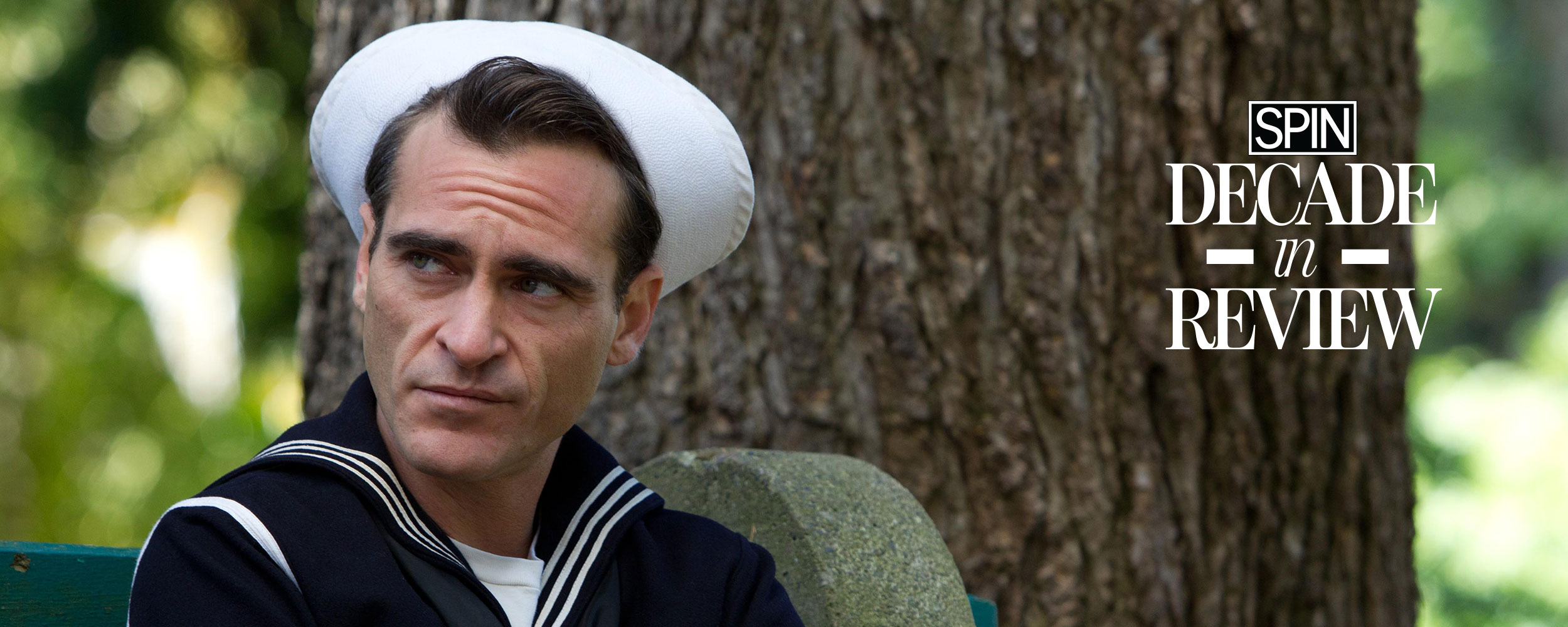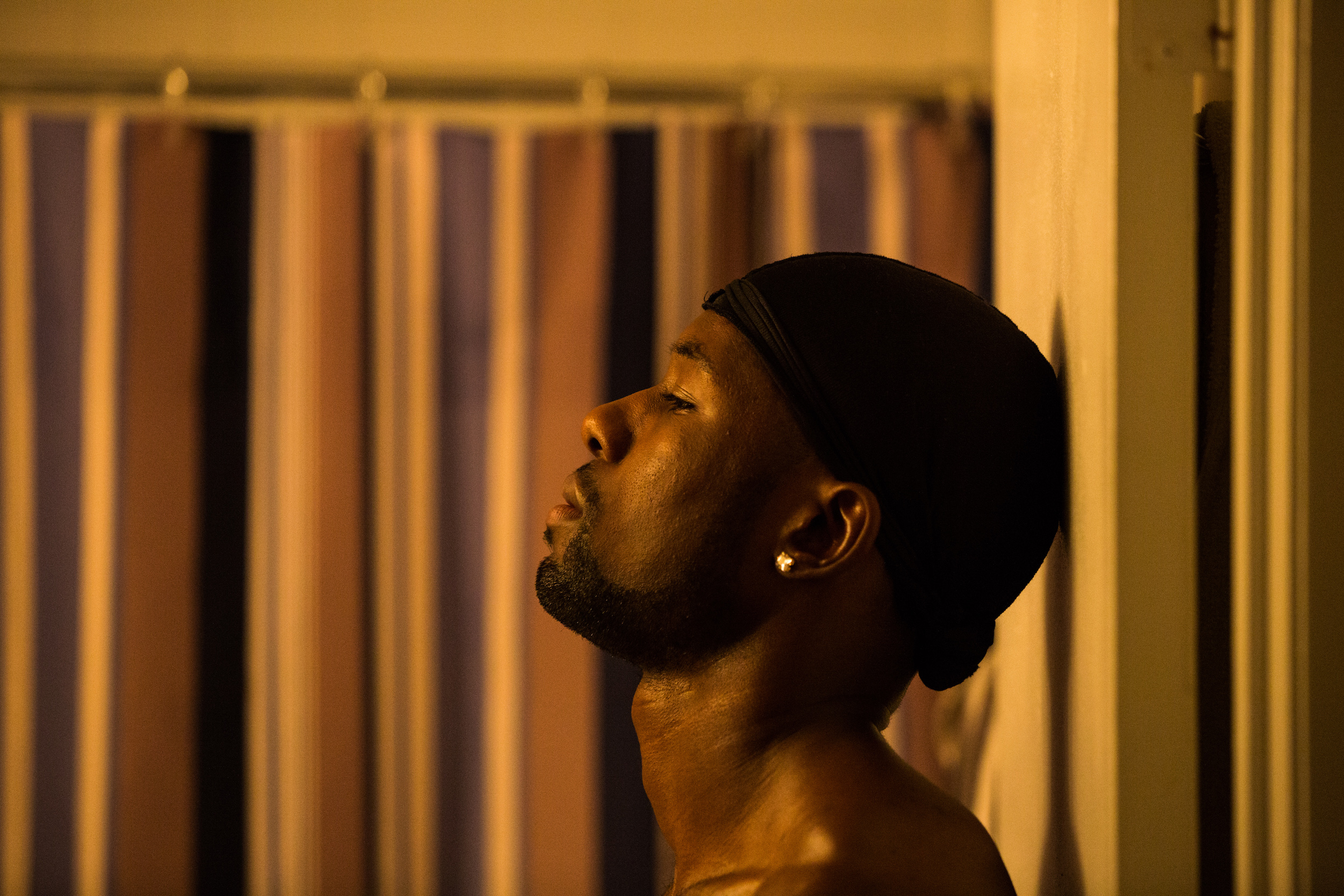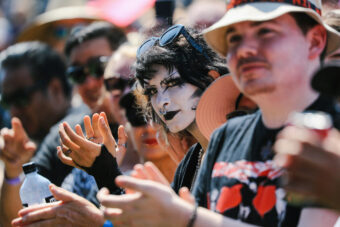There’s a cruel dichotomy signified by the color blue. It calls to mind the omnipresence of the skies and the ocean’s unfathomable expanse. These are images both of freedom and overwhelming vastness—a reminder of our decaying bodies’ limitations. Discovery begets this sense of imprisonment.
Moonlight, which follows an impoverished black person named Chiron from boyhood through adulthood (played by Alex Hibbert, Ashton Sanders, Trevante Rhodes) as he struggles with his queerness and masculinity, makes use of saturated colors. His crack-addicted, self-hating mother (Naomie Harris) is bathed red during as she spews verbal abuse, and industrial orange streetlights prickle the night sky as Chiron kisses his boyhood friend Kevin (Jaden Pine to Jharrel Jerome to The Knick’s André Holland) on the beach.
But director Barry Jenkins’ genius return to cinema, which is based off Tarell Alvin McCraney’s play In Moonlight Black Boys Look Blue, seems to put an extra weight on shades of blue. It paints the school walls where Chiron is bullied within. It’s the color of the moonlight that illuminates his dreams. It’s the color scheme of his broken home. Blue is both Chiron’s imprisonment and his salvation.
Moonlight is a film conscious of how failing institutions destroy the black community: Institutionalized black men replace drug dealers, and a surrogate father (Juan, played compassionately by Mahershala Ali) can only do so much good if he’s also making a living by selling crack to a mother, a jarring realization Chiron makes in one heartbreaking scene. But these cycles are mentioned in passing as checkpoints in a brutal reality. What makes this film a frontrunner for film of the year is its central the process of establishing identity–that queerness and race are not biological traits, but rather sociological ideas. The film reveals that identity evolves with the way we interact with society, and that we will be forced to tangle with the perception of those terms– “queerness,” “race”– taking on their narratives, their mores, and their burdens. Moonlight examines Chiron’s fight to simply become himself.

Also Read
30 Great Movies That Defined the 2010s
[featuredStoryParallax id=”213111″ thumb=”https://static.spin.com/files/2016/10/20151023_Moonlight_D08_C1_K1_0121-1477077011-300×200.jpg”]
This internal and interpersonal struggle is deftly expressed throughout the film. Chiron is never given a soapbox from which to deliver some scene -stealing soliloquy about his pain. (In fact, one character jokes that he barely speaks more than three words at a time.) But that pain is viscerally present in his expression and that of those who surround him; in longing stares and the resolute loneliness that silently erodes so many black men. The images of the children maliciously ignoring or chasing after Chiron at the film’s start are partially presented out of focus and off-frame. It’s a tightrope walk between dream and reality: memories from his childhood manifest to give context for his introversion. All of this is made bare to the audience, and makes it all the more deflating to watch Chiron become a drug dealer whose gold fronts, chains, and durag clearly serve as an armor.
And outward posturing rarely heals inward corrosion. While the film’s school bully Jenkins (Patrick Decile) is indefensible, he’s one-dimensional enough to only serve as a stand-in for the ugliness of masculinity. Juan is genuinely a decent dude who develops loving paternal relationship. But Chiron eventually realizes this is a drug dealer who’s destroying his home. When he storms a during the dinner scene after realizing this, Juan is left to reconcile with his sins through his tears. Kevin is the closest thing Chiron has to a companion, but he betrays and assaults him when his manhood is questioned. And then there’s the bruised and lacerated Chiron sitting in a school office in the aftermath. A faculty member says “if he were a man,” he’d point out the kids who assaulted him.
“You don’t even know me,” he heaves, breaking into sobs.
In Moonlight, Chiron’s biggest wish is to be recognized–as a person and nothing else. That elusive sense of fulfillment is at the core of two of Moonlight’s most memorable scenes: In a childhood memory, as Juan teaches a child Chiron how to swim, the camera temporarily submerges as we watch the makeshift father-and son-duo, renewed and gleaming within the vastness. And later, with the celestial, blue aura acting as a protecting agent from awaiting violence, romantically uniting teenaged Kevin and Chiron within its freeing glow.
There’s an open-endedness with which Moonlight prods masculinity that trails from the start to its warm final embrace at the end. It seems to argue that although it may be part of a man’s identity, but it’s not the totality of their existence. In a talk given at Medgar Evers last evening, author Zadie Smith mentioned that “Many are brutalized but not all become brutal.” This wasn’t a direct reference to Moonlight, but it does reflect the same ideology, and why the film resonates so strongly. The black body is constantly brutalized, in art as in life, which is why it’s cathartic for a black audience to see it beautifully rendered human and watching that pure humanity be acknowledged.




